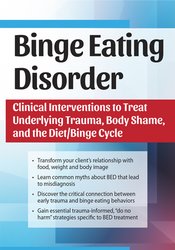

Body shaming comments. Lengthy dieting history. Shame associated with food choices. Black and white rules around eating. Talking frequently about weight loss/gain – or evading the issues completely. Does your client have disordered eating or binge eating disorder?
Three times more common than all other eating disorders combined, Binge Eating Disorder is pervasive across gender, race, sexual orientation, and socioeconomic status throughout the United States. And given that 80% of clients with BED also have a history of trauma, you need to know how to assess and treat this disorder regardless of your clinical specialty.
If you’re doing trauma work, you may already have clients with BED. Are you prepared?
In this recording, join Amy Pershing, LMSW, ACSW, author, psychotherapist and expert on BED, as she introduces a comprehensive, evidence-based toolkit of successful interventions that:
Don’t miss this unique opportunity to help your clients make peace with food and their bodies!
| File type | File name | Number of pages | |
|---|---|---|---|
| Manual - Binge Eating Disorder (13.4 MB) | 106 Pages | Available after Purchase | |
| Manual - Binge Eating Disorder - French (13.4 MB) | 106 Pages | Available after Purchase | |
| Manual - Binge Eating Disorder - Italian (13.4 MB) | 106 Pages | Available after Purchase | |
| Manual - Binge Eating Disorder - German (13.4 MB) | 106 Pages | Available after Purchase | |
| Manual - Binge Eating Disorder - Spanish (13.4 MB) | 106 Pages | Available after Purchase |

Amy Pershing, LMSW, ACSW, is the Founder of Bodywise, the first binge eating disorder (BED)-specific treatment program in the United States, founded in 1995. She is the Director of Pershing Consulting, which offers training to clinicians treating BED around the world. Amy is also the creator of "Hungerwise™," a 9-week program for ending chronic dieting and weight cycling using the Attuned Eating And Movement approach, offered nationally online. Based on over 30 years of clinical experience, Amy has pioneered a treatment approach for BED that is strengths-based, incorporating Internal Family Systems, somatic trauma techniques, Attuned Eating and Movement, and a Health at Every Size philosophy. Amy lectures internationally and writes extensively on the treatment of BED and her own recovery journey for both professional and lay communities. She has been featured on radio, podcast, and television speaking about BED treatment and recovery, relapse prevention, weight stigma, and attuned eating and movement. She is a founding member and Past Chair of the Binge Eating Disorder Association (BEDA), and is the winner of BEDA's Pioneer in Clinical Advocacy award. She is the author of the book Binge Eating Disorder: The Journey to Recovery and Beyond as well as many articles and chapters about BED treatment and advocacy.
Speaker Disclosures:
Financial: Amy Pershing is the founding director of Bodywise and the Vice President of The Center for Eating Disorders. She is an author with Routledge Publishing and Receives royalties. Ms. Pershing receives a speaking honorarium, book royalties, and recording royalties from PESI, Inc. She has no relevant financial relationships with ineligible organizations.
Non-financial: Amy Pershing is a member of the National Association of Social Workers, the Academy for Eating Disorders, and the Academy of Certified Social Workers. She is a founding board member of the Eating Disorders Action Network and is the membership chair for the Eating Disorders Professional League of Michigan.
Get to Know Binge Eating Disorder (BED)
Complex Trauma and Binge Eating
Assessment & Treatment Planning
Clinical Strategies for Processing Trauma and Stopping the Binge Cycle
IFS-Informed Recovery Strategies
Attuned Eating and Movement: Stepping into the Body
Reinventing Body Image: Help Clients Feel at Home in their Bodies
Building Resiliency to Relapse
Clinical Considerations
Please wait ...